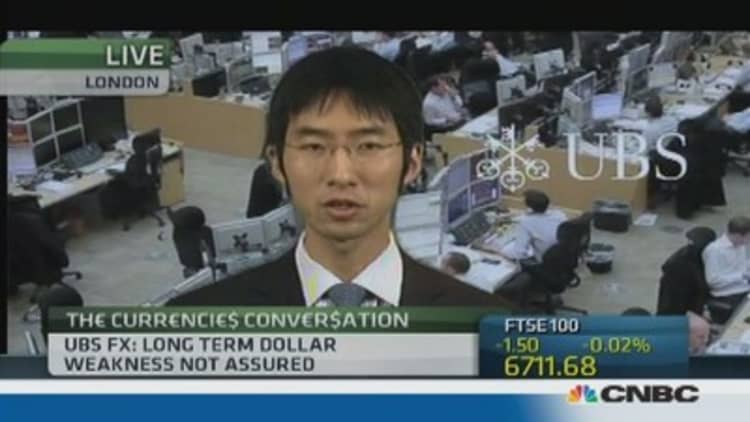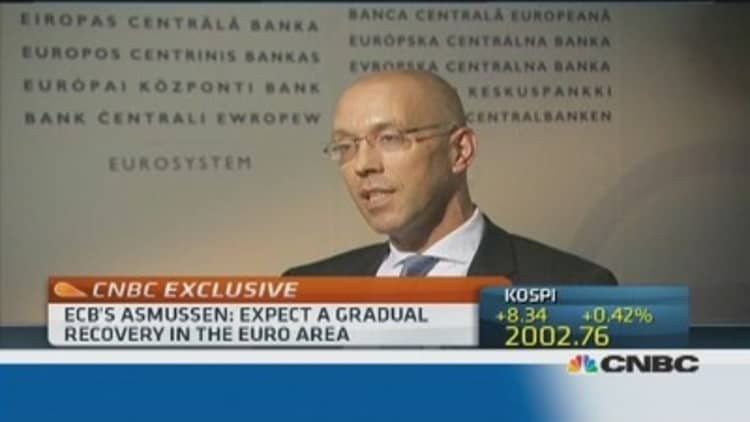The euro area has always been an attractive investment destination for those willing to bet against irrational spells of gloom and ill-informed expectations of an imminent unraveling of the monetary union.
That has not changed. Many people still have great difficulties believing that the European experiment of closely trading nation states deciding to tie the monetary knot on hardly more than a firm political commitment could live on; yet it does. The euro is climbing and things are beginning to look up even in places such as Portugal, Spain, Italy and Greece, where austerity policies continue to sap demand, output and employment.
(Read more: Why we like European currencies right now: Goldman)
And just as that tough-loving Angela Merkel, whom voters affectionately call "Mutti"(Mum), keeps repeating: take the fiscal medicine to live within your means, cut down the bloated public sector, work harder to sell more and you'll be alright; investors may even begin to trust you again so you won't have to depend on money from the troika (International Monetary Fund, European Union Commission and the European Central Bank) doled out under draconian conditions.

As always, "Mutti" knows best …
That's what we are seeing. Huge capital flows are coming into the euro area, lifting the currency many "experts" still see as doomed. Since its most recent low in late May, the euro is up 8 percent against the U.S. dollar. The euro's trade-weighted value gained more than 5 percent over the last twelve months, and it won't be long until German exporters begin screaming once again that an overvalued euro exchange rate is spoiling their trade.
Capital inflows are so strong that German equity markets are setting new record-highs, and euro area stock prices are now chasing liquidity-driven U.S. stock market indices.
Erstwhile fiscal miscreants are also seeing a slow return of investor confidence. Despite meager progress on deficit cuts, bond yields have come down since the beginning of the year in Italy, Spain, Portugal and Greece, even though, over that time, they rose by 30 basis points in Germany. That has reduced these countries' yield differentials with Germany – ranging from 36 basis points in the case of Italy to 3 percentage points in the case of Greece.
(Read more: Euro is 'too strong, too German': French minister)
What is the way ahead?
Disciplined policy easing
There are several issues to watch: growth dynamics, monetary policy, banking union and political developments in Germany and Italy.
Euro pessimists are quick to point out the monetary union's slow recovery and estimated economic growth of about 1 percent next year, compared with much stronger numbers for China, U.S. and Japan.
That is true, but that's also a good reason to bet on the appreciation of relatively cheaper euro equity markets, and on higher bond prices in an area committed to price stability and a disciplined fiscal adjustment.
Growth may also be better than currently expected. Export-driven recoveries in Portugal, Spain, Italy and Greece could benefit from some policy loosening in France and in large surplus countries like Germany, Sweden, Netherlands, Switzerland, Austria and Denmark.
Growth initiatives will be at the top of the union's summit agenda in mid-December. By that time, Germany will probably have its new government, where euro area growth stimulus is one of the key demands of German Social Democrats (SPD), the likely coalition partners with Christian Democrat parties of CDU and CSU.
(Read more: Sell US, buy European assets: Strategist)
Banking union and the ECB's tough policy call
Measures at the euro area level to stimulate growth are particularly important at a time when the monetary policy is undergoing a difficult adjustment period. The ECB's balance sheet is shrinking because euro area banks have been repaying loans they received as part of the crisis management to protect the financial system.
A steadily appreciating euro exchange rate – an event technically equivalent to monetary tightening – is also compounding the depressive impact of the shrinking money supply. That sort of policy configuration is the last thing the area needs at this stage of its fledgling recovery.

What will the ECB do?
With negative real short-term interest rates (minus 0.8 percent), the ECB does not want to cut its policy rates to zero, but it is committed to providing plenty of liquidity to the banking system.
How much will that help? Not a whole lot. In the year to August, the annual decline of bank lending to the euro area private sector accelerated to 2 percent. Lending to households was stagnant, but lending to the corporate sector was falling at an annual rate of 3.8 percent.
All that could even get worse in the months ahead as banks continue to clean up their balance sheets in preparation for ECB's stress tests – an exercise that is part of the forthcoming euro area banking union. That is why "shovel-ready" euro area investment projects could play an important role to support the incipient recovery while the monetary authorities continue to set up their new supervisory and regulatory functions.
(Read more: Is the euro the next currency battleground?)
There is plenty here for investors to watch. Indeed, how will the ECB manage this transition process without jeopardizing access to credit is much more important for investors than paying attention to complaints from some north European countries that the heavily indebted countries in the south must get their financial institutions in shape for the banking union.
That is some northern chutzpah at the time when rumors are swirling around that Germany's second-largest bank could have problems making the grade.
But the banking union is on; euro area leaders have committed last Friday to solving the only major outstanding issue – the Single Resolution Mechanism – by the end of this year. That is the procedure to wind down failing banks, a decision Germany apparently wants to postpone until it has a fully functioning government with a strong parliamentary backing.
German and Italian governing coalitions
Germany's new coalition government is a work in progress. Views seem to be converging on major issues. The latest is that the SPD appears to be angling for negotiating advantage from Chancellor Merkel's embarrassment about her cell phone bugging. The SPD may try to block (temporarily) the EU-U.S. free trade agreement. They may also try to push aside some CDU-CSU leaders they blame for the spying scandal to get more important ministerial posts for themselves.
Italy is potentially more problematic. The former Prime Minister Silvio Berlusconi re-launched last Friday his center-right Forza Italia (Go Italy) party he founded in 1994, abandoning the Popolo della Libertà (People of Freedom – PdL) brand he was using since 2007. Berlusconi is also threatening that Forza Italia may not support the coalition government with the center-left party if the Italian Senate voted to expel him. That would mark the end of his political career and open him to all sorts of jail sentences and prosecutions.
Indiscretions from high-level political operators point to a likely arrangement to save the government and spare Italy's post-WWII longest-serving prime minister that ultimate indignity.
The euro area investment horizon has cleared up. A sustainable economic recovery is under way, along with structural changes, fiscal adjustment and the implementation of the banking union.
Follow the author on Twitter @msiglobal9
Michael Ivanovitch is president of MSI Global, a New York-based economic research company. He also served as a senior economist at the OECD in Paris, international economist at the Federal Reserve Bank of New York and taught economics at Columbia.



